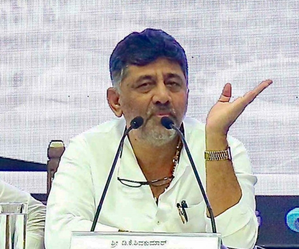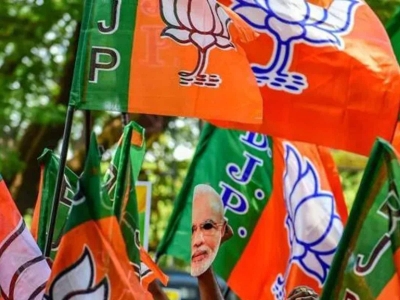Exit Poll Predictions Will Be Proven Wrong, Says Dy CM Shivakumar

Bengaluru, Nov 22: Karnataka state Congress President and Deputy Chief Minister D.K. Shivakumar has said that all exit poll predictions regarding the Maharashtra Assembly election and Karnataka bypolls will be proven wrong and the Congress party will emerge victorious.
Speaking to the media in the temple town Murudeshwara in Uttara Kannada district on Friday, Shivakumar said, “We will win for sure. The exit poll predictions will be reversed. On record I am making this statement and the media should show this. The exit poll results are going to be reversed.”
“I have carried out campaigning in Maharashtra state. We have confidence that we are surely going to win there. AICC President Mallikarjun Kharge has stated that we will form the government with a thin margin in Maharashtra state. He has also spoken to all leaders and I have also been to Maharashtra. I could see that everything was smooth and well for the party,” Shivakumar stated. “However, no one knows what is inside the voting box,” he added.
When asked about results in Jharkhand state, he stated “I don’t know about the outcome of results about Jharkhand state.”
Answering a question on the exit polls predicting Congress defeat in high profile Channapatna Assembly segment in the state and Minister for Waqf and Housing Zameer Ahmad Khan’s racist ‘Kaala Kumaraswamy’ comment hurting the chances of the party, he stated, “We have done our duty. I have the full confidence of victory.”
“In the last Assembly election, the Congress party got only 16,000 votes. In my Kanakapura constituency, the Magadi seat represented by Congress MLA Balakrishna seat and Ramanagara seat represented by Congress MLA Iqbal Hussain, we won both. Only Channapatna seat we had lost. However, this time we will win,” Shivakumar maintained.
On the question of whether the racist ‘Kaala Kumaraswamy’ comment proved to be a setback for the party, Shivakumar stated, “I have given him (Minister Zameer Ahmad Khan) a piece of advice. He is a good worker and contributes well to the party. He had made certain statements in haste and I have stated that those remarks were wrong.”
“Being a state President of the party, I have stated that the racist comments were wrong and after I spoke to Minister Zameer, he tendered an apology and there is no need to make that a big matter,” the Dy CM said.
When asked about cabinet expansion, he stated, “I am not the Chief Minister yet, Siddaramaiah is the Chief Minister and is the one who reshuffles the cabinet.”
Talking about his trip to coastal Karnataka, Shivakumar said, “I went scuba diving and swam with local MLAs. The natural beauty of the coastal region needs to be explored efficiently. In Karnataka state, there is 300 km of coastline and it should prosper. Thousands should benefit and investors will have to come here.”
He further said, “Jobs have to be created. I went to Bangkok 15 years ago, I compared them with our local boys, who are on par with them in terms of talent. Our boys can deliver on international standards. I have visited to do all this…”
“I and CM Siddaramaiah have told Minister H.K. Patil to prepare a separate tourism policy for the coastal region and it is being prepared,” he stated. The Murudeshwara and other beaches in our state are on par with the Goa beaches and in no way are inferior. They need to be explored,” he underlined.
–IANS






